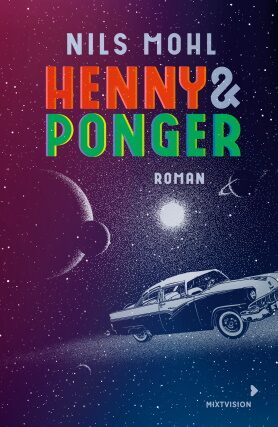Nils Mohl
Henny & Ponger
[Henny & Ponger]
- Mixtvision
- Munich 2022
- ISBN 978-3-95854-182-5
- 320 Pages
- Publisher’s contact details
Translation Grant Programme
For this title we provide support for translation into the Italian language (2022 - 2024).
For this title we provide support for translation into the Italian language (2022 - 2024).
Sample translations
An Exploration of the Margins - Nils Mohl’s novel “Henny and Ponger”
Readers can expect to be delightfully vexed by Nils Mohl’s new novel, “Henny and Ponger”. Mohl is a poet, a linguistic tease among German YA authors, a pithy chronicler of young people struggling to find their way in the maelstrom of growing up – as his German Youth Literature Award-winning 2011 novel “Es war einmal Indianerland” (“Once upon a Time there was Indian Land”) demonstrates. In all his stories, the 51-year-old author juggles with all of our expectations, and surprises us with unforeseen twists and turns.
But with “Henny and Ponger”, Mohl’s juggling ability reaches new levels which surprise even this seasoned reviewer. Initially, we seem to be in familiar territory: “a tender, thrilling coming-of-age love story which could be about any young lovers.” Ponger – a talented inventor and craftsman aged around 18 – is on the S-Bahn, making his way home from work. Or, more precisely, he’s on Number 31, heading for Hamburg-Altona. (All the places in the novel are real. This grounds the story; the reader is almost tempted to have a map or Google Maps open alongside the novel). Ponger, then, is sitting in the carriage in his work overalls. There’s an open book on his knee. He notices a young woman diagonally opposite him who is also reading a book. It soon transpires that she’s reading the same book as he is: John Green’s Paper Towns. Is this an instant affinity between them? She’s also incredibly pretty. Ponger is blown away. He tries to catch her eye. In vain. He has long missed his stop, but carries on sitting there. A typical beginning to a tragi-comic love story complete with all its highs and lows. There’s no reason for us to expect a schmaltzy happy ending; it could just as well have an open ending like the liaison between Margo and Quentin in John Green’s novel.
But as we immerse ourselves in the novel, we start to wonder. Is this really just a love story? The more we get to know the two protagonists – Ponger calls the young woman who approaches him in a most unexpected way Henny – the more mysterious we find them. Ponger appears to be suffering from memory loss. His background is a mystery to him. All he knows is that a slightly weird old woman, Pearl, and an even weirder old American man took him in and looked after him. The only person he trusts apart from Pearl is his boss, a woman who runs a workshop for ancient pinball machines (“Ponger likes these zones at the margins of civilisation”). And Ponger, the brilliant repairer, can carry out the most complicated tasks more or less in his sleep.
Thus begins a road movie which takes place between Hamburg and the North Frisian island of Amrum, between the bleak concrete city and vast stunning beaches, and with twists and turns which even this seasoned YA reviewer would never have expected. Just when you think you’ve settled into the rhythm of a road movie, novellistic elements cut in and twist the story back to mystery or science fiction. Henny needs Ponger’s help with repairing an unusual item, and believes she’s being pursued by strange men.
Here I must pause and adhere to the reviewers’ code of honour and not give away any spoilers – never mind the ending. However, there’s one thing I can say, and that is: the more enigmatic the protagonists become, the more complex becomes the inner world which they inhabit. At the same time, however, the astute reader/companion who is hot on the heels of the young couple even as they traverse the bumpy path through the nocturnal island forest realises that the narrator is gradually revealing the true heart of the story: the endless desire of young people to have their uniqueness, their abilities and fears, their lust for life and their dreams recognised – against the powerful current of conformity, uniformity and indifference.
Nils Mohl juggles all kinds of different genres: the novel is packed with filmic, literary and musical allusions and the story races almost breathlessly through all 202 of its dramatic chapters until it reaches an ending that nobody would expect. John Green would enjoy it, and Margo and Quentin would be giving Henny and Ponger an admiring pat on the back.

But with “Henny and Ponger”, Mohl’s juggling ability reaches new levels which surprise even this seasoned reviewer. Initially, we seem to be in familiar territory: “a tender, thrilling coming-of-age love story which could be about any young lovers.” Ponger – a talented inventor and craftsman aged around 18 – is on the S-Bahn, making his way home from work. Or, more precisely, he’s on Number 31, heading for Hamburg-Altona. (All the places in the novel are real. This grounds the story; the reader is almost tempted to have a map or Google Maps open alongside the novel). Ponger, then, is sitting in the carriage in his work overalls. There’s an open book on his knee. He notices a young woman diagonally opposite him who is also reading a book. It soon transpires that she’s reading the same book as he is: John Green’s Paper Towns. Is this an instant affinity between them? She’s also incredibly pretty. Ponger is blown away. He tries to catch her eye. In vain. He has long missed his stop, but carries on sitting there. A typical beginning to a tragi-comic love story complete with all its highs and lows. There’s no reason for us to expect a schmaltzy happy ending; it could just as well have an open ending like the liaison between Margo and Quentin in John Green’s novel.
But as we immerse ourselves in the novel, we start to wonder. Is this really just a love story? The more we get to know the two protagonists – Ponger calls the young woman who approaches him in a most unexpected way Henny – the more mysterious we find them. Ponger appears to be suffering from memory loss. His background is a mystery to him. All he knows is that a slightly weird old woman, Pearl, and an even weirder old American man took him in and looked after him. The only person he trusts apart from Pearl is his boss, a woman who runs a workshop for ancient pinball machines (“Ponger likes these zones at the margins of civilisation”). And Ponger, the brilliant repairer, can carry out the most complicated tasks more or less in his sleep.
Thus begins a road movie which takes place between Hamburg and the North Frisian island of Amrum, between the bleak concrete city and vast stunning beaches, and with twists and turns which even this seasoned YA reviewer would never have expected. Just when you think you’ve settled into the rhythm of a road movie, novellistic elements cut in and twist the story back to mystery or science fiction. Henny needs Ponger’s help with repairing an unusual item, and believes she’s being pursued by strange men.
Here I must pause and adhere to the reviewers’ code of honour and not give away any spoilers – never mind the ending. However, there’s one thing I can say, and that is: the more enigmatic the protagonists become, the more complex becomes the inner world which they inhabit. At the same time, however, the astute reader/companion who is hot on the heels of the young couple even as they traverse the bumpy path through the nocturnal island forest realises that the narrator is gradually revealing the true heart of the story: the endless desire of young people to have their uniqueness, their abilities and fears, their lust for life and their dreams recognised – against the powerful current of conformity, uniformity and indifference.
Nils Mohl juggles all kinds of different genres: the novel is packed with filmic, literary and musical allusions and the story races almost breathlessly through all 202 of its dramatic chapters until it reaches an ending that nobody would expect. John Green would enjoy it, and Margo and Quentin would be giving Henny and Ponger an admiring pat on the back.
Translated by Helena Kirkby

By Siggi Seuß
Siggi Seuß, freelance journalist, radio script writer and translator, has been writing reviews of books for children and young people for many years.
Publisher's Summary
The circus dog Puk introduces us to his performing friends. While they show what they are capable of in the manege, we find out about life behind the scenes, beyond the spotlight. About stage fright, bizarre rituals and the odd secret that remains hidden to normal spectators. With her unmistakable touch, Verena Lichtsinn captures the unusual artistes and their world between light and shade.
(Text: Mixtvision)
